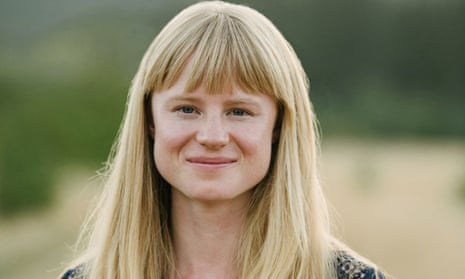Emily Ruskovich was sitting in her back garden in Boise, Idaho, playing in the grass with her one-year-old daughter, when she got the phone call to tell her that she had won the world’s richest prize for a single novel: the €100,000 (£88,000) International Dublin literary award. The 33-year-old debut novelist says she kept thinking she must have misunderstood or hallucinated the news.
“I didn’t speak at first, then I reacted with great joy, but then I also felt really uncertain,” she says. “I couldn’t really believe it had happened. It was just a quiet little moment in the grass with my baby and my life was completely changed.”
Ruskovich’s first novel, Idaho, had won a prize awarded to writers including Nobel laureate Orhan Pamuk and last year’s winner, Irish novelist Mike McCormack. Public libraries around the world nominate their favourite novels to form a very long longlist (141 books this year). Idaho was put forward for the prize by just one library: a branch in Bruges, Belgium.
Set in the mountains where Ruskovich herself grew up, Idaho tells of a mother who kills her younger daughter with an axe while the family is chopping logs in a clearing. But the judges said the book was no thriller, rather that it “gradually uncovers the psychological abysses that would explain the inexplicable”.
“The deed remains the deed, and the murderous evil of it stays ambivalent and mysterious to the end,” they said, as they announced its victory from a shortlist that included the Booker-winning Lincoln in the Bardo by George Saunders. “Empathy and love stand next to cruelty and crime. Individual guilt, trauma and pain are looming as large as eventual forgiveness and the ability to live in half-knowledge. Ultimately, Idaho evolves into a masterpiece on the redeeming and regenerative potential of music, poetry, literature and art.”
Ruskovich says the crime at the heart of the novel stems from an uncanny experience she had while cutting firewood with her parents. After arriving at a clearing where “everything was beautiful, and there was the sound of grasshoppers and crows sunning themselves on the logs”, she immediately had “this intense feeling of grief as if the place itself had a memory and I had just stepped into the memory.
“I just knew something terrible happened there. I’ve never had an experience like that in my life. I’ve received feelings from different places but this was different. My parents said it was like I was in a mild trance that whole day, they could tell something was wrong with me. I couldn’t get it out of my system so writing the novel was the process of figuring out what I imagined had happened in that place,” she says.
Ruskovich grew up in the Idaho Panhandle, on Hoodoo Mountain, with her family living for a time in tents. Like the characters in her book, it was “very, very rural”, with an hour’s drive to high school every morning. “It’s like nowhere on earth. It’s very beautiful but I do feel there are so many sinister pockets in Idaho, including the place I grew up,” she says. “It was a wonderful place to grow up, so intense and vivid … but all around our loving family property there were pockets of poison, lots of backwoods, dangerous people. Good people, too, but we were robbed many times. It was kind of a scary place to grow up when I think back on it.”
Winning the International Dublin award, she says, will mean she can “return much more vigorously to my writing”. She and her husband recently moved from the “ghost town” of Idaho City to Boise, where she teaches creative writing while writing fiction.
“It’s such a shocking amount of money to have won! I can’t believe there is a prize like this for a single novel. I don’t know exactly what I’ll do with it but I feel I can now make choices that will ultimately really benefit my writing,” she says. “It’s been the biggest honour of my life having a book out in the world and having readers.”

Comments (…)
Sign in or create your Guardian account to join the discussion